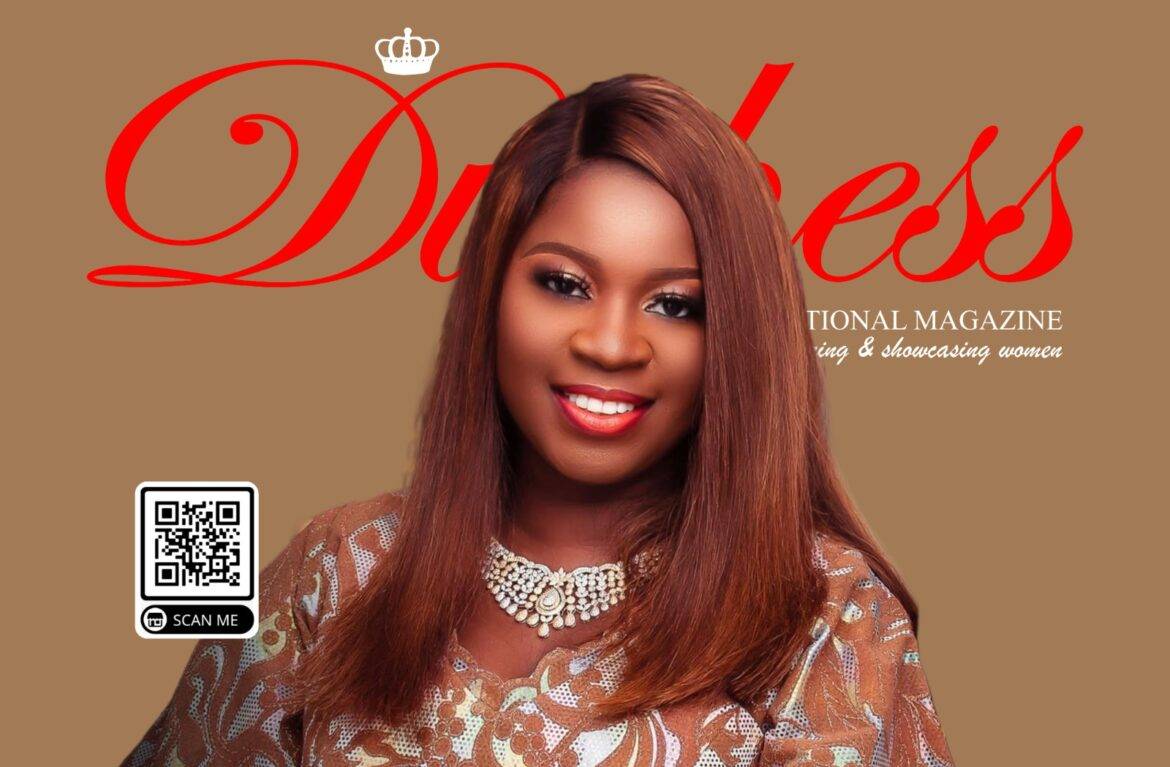Abolaji Odunuga is the Visionary Convener, Duchess International Women’s Day Conference, CEO/Principal Partner, Custodian Global Consult. Media Executive | Researcher at the University of Kent | Advocate for Diversity and Inclusion | Founder, African Community in Surrey & Sussex (ACISS) | 70th President, Rotary Club of Crawley | Visionary Convener, Duchess International Women’s Day Conference (#DIWDC). One of her brands, Duchess International Magazine is celebrating 10 years this year.
For over a decade, Abolaji Odunuga has been at the forefront of driving change through leadership, community building, and advocacy. As the Visionary Convener of the Duchess International Women’s Day Conference #DIWDC and CEO/Principal Partner of Custodian Global Consult, she has cultivated a global platform has been consistently empowering, showcasing and celebrating African women, both on the continent and in the diaspora. Beyond DIWDC, her influence spans across multiple sectors—she is a media executive, a researcher at the University of Kent, an advocate for diversity and inclusion, and the Founder of the African Community in Surrey and Sussex (ACISS). Her leadership extends into service when she became the 70th and first black President of the Rotary Club of Crawley, a role through which she continues to champion community transformation.
As Duchess International Magazine celebrates its 10th anniversary, we sit down with Odunuga to explore the vision behind Duchess INternational Magazine and DIWDC, the defining moments that shaped its inception, and the challenges she overcame in building a movement that unites women from all walks of life. In this exclusive interview, she shares how her diverse experiences in technology, leadership, and advocacy laid the foundation for a conference that is not just an event, but a global force for progress, inclusivity, and transformative change.
Question 1: Your journey spans technology, leadership, community building, and advocacy. How did your experiences in these diverse fields shape the vision for the Duchess International Women’s Day Conference (#DIWDC)?
The vision for the Duchess International Women’s Day Conference is a culmination of everything I’ve learned, felt, and experienced across the many paths I’ve walked. My journey in technology taught me the importance of precision and problem-solving. In a way, technology is like life: you troubleshoot, you innovate, and you adapt to create solutions that are both impactful and sustainable. That same mindset shaped my approach to leadership, where every decision needs to be strategic yet empathetic, balancing results with human connection.
Leadership gave me the opportunity to step into rooms where I could amplify voices that weren’t always heard. Community building taught me that we thrive when we collaborate, and advocacy revealed to me the power of storytelling—because it’s through stories that people connect, learn, and grow. All of these fields converged into one clear truth: progress happens when we bring people together around a shared purpose.
The annual event was born out of that understanding. It’s not just a conference; it’s a global platform where women from diverse walks of life come together to not only share their stories but also spark change. Each edition is like writing a new chapter in the story of African women—on the continent and in the diaspora—taking charge of their destinies, challenging norms, and inspiring transformation. Every skill I’ve honed, from managing complex systems in IT to bridging cultures and advocating for diversity, finds its home in this vision.
I often say connection is my life’s work, and #DIWDC embodies that. It’s a movement that connects dreams with possibilities, leaders with aspiring changemakers, and ideas with action. That’s the ultimate synergy of my journey.

Question 2: What was the pivotal moment or experience that sparked the idea for the Duchess International Women’s Day Conference? And how did yotou overcome the initial challenges in turning that vision into a reality?
The spark for the Duchess International Women’s Day Conference came from a deeply personal realization: when it comes to engagements, advocacies and discussions about African women, there’s the need to redirect our focus from specific aspects women’s challenges, often excluding the critical roles men play or narrowing scope to women and girl-children alone. And that became the primary motivation for the Duchess International Women’s Day Conference and Duchess Africa. So, apart from our dynamic and holistic inclusivity—recognizing that overcoming systemic and social challenges requires the engagement of men as allies, collaborators, and advocates, we are intentionally incorporating men into the conference programming, workshops, and initiatives, alongside a balanced focus on empowering both the girl-child and the boy-child. DIWDC fosters a comprehensive approach to creating transformative, sustainable change.
Also, I’ve had the privilege of sitting in spaces where decisions are made—spaces that too often lacked diverse representation. I realized that if we, as African women, didn’t create platforms to tell our stories, someone else would—and they might not tell them the way they deserve to be told.
Turning the vision into reality wasn’t without challenges. The first hurdle was creating a platform that would resonate across generational, cultural, and professional divides. I knew it couldn’t just be another event. It had to be a movement that addressed real issues like economic empowerment, leadership, health, and cultural preservation. Building trust among partners and stakeholders was another challenge, especially in an environment where resources can be scarce.
We started small but focused on quality and authenticity. The first edition in Kigali was proof of concept. Women came together, not just to listen but to lead, collaborate, and commit to action. What helped us overcome those early obstacles was staying true to the mission. And when we hoted the second edition in Nairobi, Kenya, we didn’t compromise on our values, and we built alliances with people and organizations that shared our vision. I also leaned heavily on my network and experience, knowing that the strongest movements are built on the foundation of trust and connection.
Read also: Anne Odeke: The ‘princess’ who broke the beauty show Color bar
A Voice for Justice, a Heart for Change: Barr. Jamila Babuba Leads a New Era for FIDA Adamawa
Meanwhile, before the Duchess International Women’s Day Conference was born, I had already laid the foundation for celebrating and elevating African women through Duchess International Magazine, which I launched in 2015. The magazine became a platform to inspire, empower, and showcase the brilliance and magnificence of African women from all walks of life. It was my way of telling our stories, amplifying our voices, and celebrating the diversity within our shared identity.
By 2023, I felt a deeper calling—a desire to do more. I decided to take the celebration of International Women’s Day beyond borders, traveling to African countries to discuss the global theme of the day, but through our lens as African women. It wasn’t just about adapting the theme to our reality; it was about addressing the unique challenges and opportunities we face and creating a space for connection, collaboration, and transformative dialogue.
Living in the United Kingdom for some time now, I’ve had a profound realization: in the eyes of a white person, I am first and foremost a Black woman—not a Nigerian woman. To them, our individual nationalities and ethnicities are not as distinct as we often perceive them to be. Yet, when I see another African woman—perhaps a Ghanaian—it’s easy for me to say, “Oh, she’s Ghanaian,” even though we look so alike, with our radiant melanin sparkling together. This contrast sparked a powerful thought: why don’t we, as Africans, start identifying ourselves as one, as Africans, instead of focusing so much on our national or ethnic labels?
That realization became the heartbeat of the conference. I wanted us, as African women, to reclaim our collective identity, to unite under a shared banner of sisterhood, and to start telling our stories—not from foreign perspectives, but from within our own lands. I want to be identified not just as a Nigerian woman, but as an African woman. Because our strength lies not only in our diversity but in our unity.
DIWDC was born from this vision—a movement to celebrate and empower African women as a unified force. It’s about breaking barriers, building bridges, and igniting a pan-African spirit that redefines what it means to lead, connect, and thrive as African women in the world today.
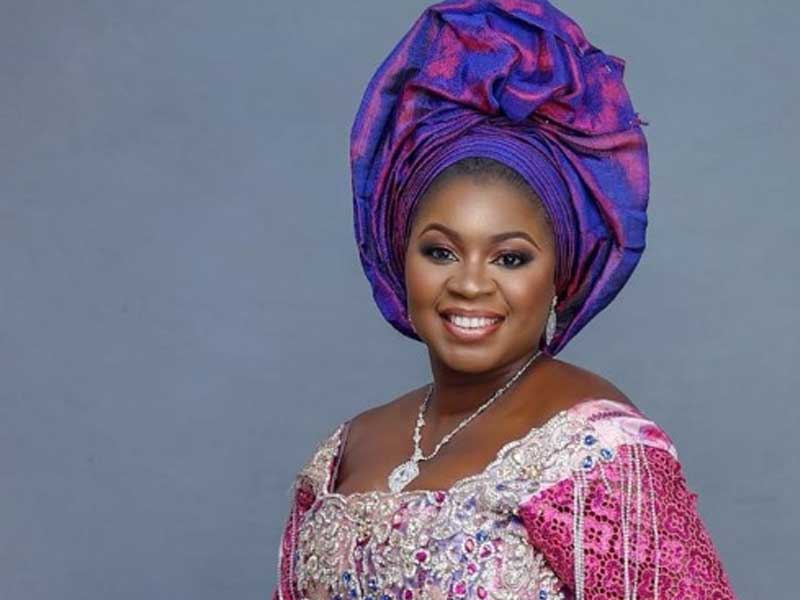
Question 3: You emphasise ‘connection’ as a defining aspect of your journey. How do you translate this philosophy into the initiatives and programmes you lead, especially for African women?
For me, connection is more than just a philosophy—it’s a lifeline. It’s about creating spaces where people feel seen, heard, and valued, and that’s at the heart of every initiative I lead. When it comes to African women, I see connection as a bridge—a bridge between their potential and their possibilities, between their challenges and the solutions they deserve, and most importantly, between each other.
At the Duchess International Women’s Day Conference, connection translates into intentional programming. We don’t just bring women together to listen to speakers; we create opportunities for mentorship, collaboration, and dialogue. Every panel, workshop, and networking session is designed to foster real relationships that extend beyond the event. When you see a young entrepreneur from Lagos exchanging ideas with a business leader from Nairobi or a healthcare advocate from Accra brainstorming with a diaspora professional in London, you realize the power of connection in action.
I also believe that connection starts with storytelling. When women share their journeys—the triumphs, struggles, and lessons—they inspire others and create bonds of solidarity. That’s why we make space for personal narratives at our events and in our magazine. It’s a reminder that we are not alone and that together, we are stronger.
Beyond events, our initiatives focus on sustainable connection. Whether it’s creating mentorship programs, building community hubs through the African Community in Surrey and Sussex, ACISS, or amplifying African women’s voices on global platforms, the goal is always to ensure that these connections lead to tangible outcomes—be it partnerships, funding, or policy influence. My philosophy is simple: when we connect the dots, we can rewrite the narrative for African women.
Question 4: From the first edition in Kigali to Nairobi and now Dakar, how has the Duchess International Women’s Day Conference evolved in scope, impact, and significance? What lessons have you learned along the way?
The journey from Kigali to Nairobi to Dakar has been nothing short of transformative, both for Women’s Day Conference and for me personally. The first edition in Kigali was intimate—a proof of concept that brought together a small but passionate group of women leaders. It was there that we saw the hunger for a platform where African women could come together to reimagine what leadership, empowerment, and collaboration could look like. That first event planted the seeds of something much bigger.
By the time we reached Nairobi, #DIWDC had grown in scope and ambition. We had more attendees, more diverse voices, and a broader agenda that tackled not just leadership but also critical issues like health, climate change, and entrepreneurship. Nairobi taught us the importance of adaptability—listening to the needs of our participants and tailoring our programs to reflect their realities.
Now, as we prepare for Dakar, the evolution is even more apparent. event has become a movement, a platform where African women from across the continent and the diaspora converge not only to share ideas but to chart actionable pathways for change. The conference has expanded in significance by focusing on cross-sector collaboration, amplifying women’s voices in global dialogues, and ensuring that every conversation leads to measurable impact. For example, our sessions now include policy advocacy, investment opportunities, and targeted training programs that address specific needs like financial literacy and digital transformation.
The lessons I’ve learned along the way are profound. First, representation matters. When women see others who look like them in positions of influence, it sparks a belief that they too can rise. Second, partnership is power. No single individual or organization can drive change alone, and our partnerships with governments, businesses, and non-profits have been key to our success. Finally, I’ve learned the importance of listening. Each edition has been shaped by feedback from participants, which ensures that we remain relevant, inclusive, and impactful.
Dakar is a reflection of this journey—bigger, bolder, and more intentional. It’s not just a conference; it’d prove how far we’ve come and a promise of what’s yet to be achieved.
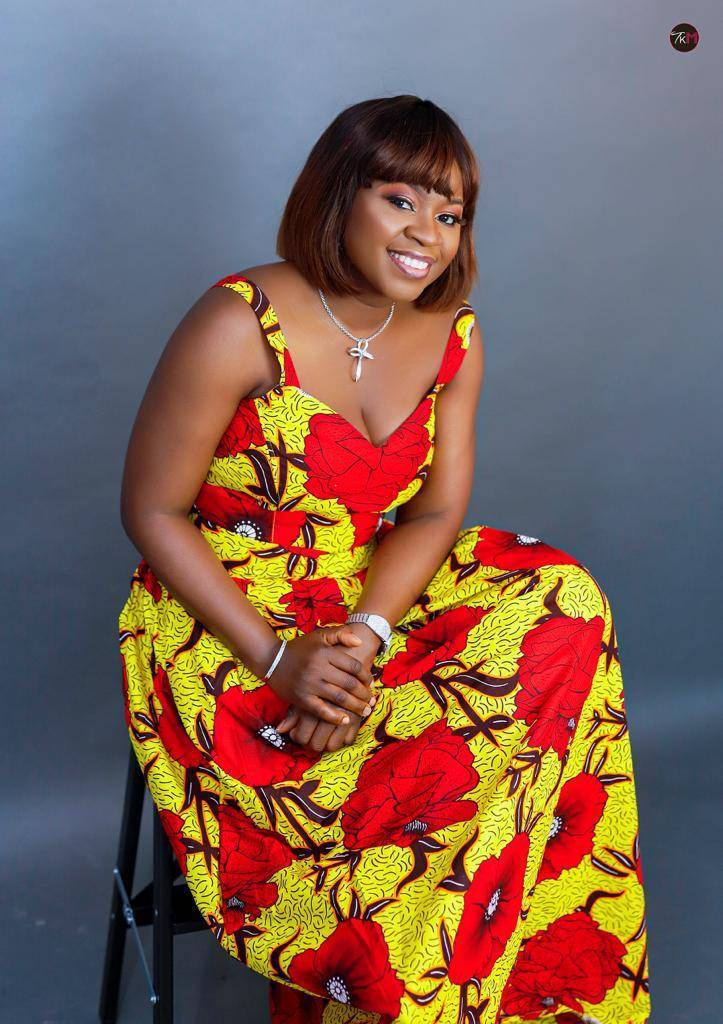
Question 5: The 2025 theme is ‘Accelerate Action: A Call to Ignite, Empower, and Engage African Women for Transformative Realities.’ What specific areas of leadership or action do you believe African women need to focus on today?
The theme for 2025, ‘Accelerate Action,’ is both a challenge and a rallying cry. It’s a call for urgency, not because African women lack capability, but because the world cannot afford to wait any longer for their full potential to be unleashed. To truly create transformative realities, I believe there are five critical areas of focus:
- Leadership in Policy and Governance: African women need to take more seats at the table where decisions are made. Whether it’s in government, international organizations, or corporate boards, we need to ensure that our perspectives and priorities are shaping policies that affect our communities. Advocacy for more inclusive systems is key here.
- Economic Empowerment: Financial independence is a foundation for empowerment. Women must focus on creating and scaling businesses, leveraging technology to access markets, and demanding equal opportunities in traditionally male-dominated industries. Programs that provide funding, mentorship, and training are essential.
- Education and Skill Development: In a rapidly changing world, education—formal and informal—remains a powerful tool for transformation. Women must invest in continuous learning, particularly in areas like STEM, digital skills, and entrepreneurship, to stay ahead and lead in innovation.
- Community and Network Building: Collaboration is the cornerstone of progress. By building networks across borders, sectors, and generations, African women can amplify their impact and create collective solutions to shared challenges. The diaspora has a critical role to play here, acting as a bridge for resources, knowledge, and global influence.
- Health and Well-Being: Without well-being, empowerment is incomplete. Women need to champion access to quality healthcare, advocate for mental health awareness, and ensure that maternal health and reproductive rights remain a priority. A healthy woman is an unstoppable force.
Ultimately, action must be intentional and unapologetic. It’s time to ignite passion, empower others through knowledge and resources, and engage in meaningful collaborations that drive change. The future is waiting, and African women are poised to lead it.
Question 6: As someone bridging the gap between the continent and the diaspora, what role do you see African women in the diaspora playing in shaping the continent’s future?
African women in the diaspora are the bridge between possibility and progress. We carry the weight of two worlds—the cultural richness of our heritage and the opportunities afforded by our experiences abroad. That dual perspective is our superpower. We see what can be because we’ve experienced it, and we understand the nuances of what it takes to implement change back home.
Diaspora women have an unparalleled ability to bring resources, knowledge, and networks to the table. But beyond the material, we also carry a responsibility to shape narratives. For far too long, the African story has been told through the lens of deficiency rather than abundance. As women of the diaspora, we have the chance to rewrite that narrative, showcasing our continent as a land of innovation, resilience, and boundless potential.
The role we play is also deeply personal. When we invest in businesses, mentor young leaders, or advocate for policies, we aren’t just contributing to the continent’s growth—we’re creating opportunities for the next generation of African women to rise. It’s about using our platform to uplift others, ensuring that our contributions go beyond symbolic and translate into tangible progress.
Philosophically, I believe we’re the weavers of a new tapestry—one where Africa and the diaspora are not two separate entities but intertwined threads of a shared destiny. Our role is to foster unity, amplify voices, and build a future where African women, whether at home or abroad, are the architects of their own narratives.
Question 7: From being the first Black President of the Rotary Club of Crawley to founding ACISS, what personal achievements hold the most meaning for you, and why?
Each achievement has its own story and significance, but the ones that hold the most meaning for me are those rooted in breaking barriers and building community. Becoming the first Black President of the Rotary Club of Crawley was not just a personal milestone—it was a moment of representation. It symbolized that diversity is not a limitation but a strength. It reminded me, and hopefully others, that we belong in spaces where decisions are made, and our contributions matter.
Founding ACISS, however, is where my heart feels most at home. ACISS is more than an organization—it’s a platform that mirrors the power of unity. When I see the African community in Surrey and Sussex come together to celebrate culture, support one another, and advocate for change, I’m reminded of why I do what I do. ACISS is a living, breathing example of how we can build bridges, celebrate our heritage, and leave a legacy for the next generation.
But beyond titles or organizations, the moments that hold the most meaning are those where I’ve seen transformation. When someone tells me that an initiative I started gave them the courage to lead or the resources to dream bigger—that’s where the real achievement lies. At the end of the day, it’s not about the accolades; it’s about the impact, the lives touched, and the doors opened for others.
Question 8: You’ve led quite a number of groundbreaking projects in spaces often resistant to change. How do you navigate resistance or challenges, and what advice would you give to women facing similar challenges?
Resistance is part of the journey when you’re trying to create change. It’s almost like an unwritten rule: the bigger the vision, the greater the resistance. Over the years, I’ve learned to approach challenges with a mix of strategy, empathy, and resilience.
The first thing I do is listen. Resistance often comes from fear—fear of the unknown, fear of losing power, or fear of change itself. By understanding the root of that fear, I can tailor my approach to address concerns without compromising the vision. People don’t resist change because they hate it; they resist because they don’t see where they fit within it. My job is to paint a picture that includes everyone.
I also rely heavily on collaboration. Change is easier to navigate when you’re not walking alone. I’ve learned to build coalitions of like-minded people who share the vision and can help champion it. This is particularly important for women because the challenges we face are often systemic. Collective action is our strongest weapon.
For women facing similar challenges, my advice is simple but powerful: stay grounded in your “why.” Resistance will test your patience, your confidence, and even your faith in the vision. But if you’re rooted in purpose, you’ll find the strength to keep going. Don’t be afraid to ask for help, and don’t let rejection deter you. Every “no” is a step closer to the “yes” that matters.
Equally important, celebrate small victories. In spaces resistant to change, progress can be slow, and it’s easy to get discouraged. But every step forward, no matter how small, is worth celebrating. It’s a reminder that change is happening—and you’re the reason why.
Question 9: What can attendees expect from #DIWDC2025 in Dakar, and how do you envision the event creating lasting impact beyond the conference?
#DIWDC2025 in Dakar will be nothing short of transformative. Attendees can expect a vibrant fusion of thought leadership, cultural richness, and actionable solutions. This isn’t just a conference; it’s an immersive experience where every session, every connection, and every conversation is designed to spark something meaningful.
Dakar, with its deep cultural roots and dynamic energy, is the perfect backdrop for this year’s theme, “Accelerate Action: A Call to Ignite, Empower, and Engage African Women for Transformative Realities.” We’re bringing together trailblazers, changemakers, and dreamers from across the continent and diaspora to collaborate on pressing issues like leadership, economic empowerment, climate action, and cultural preservation. Expect hands-on workshops, high-impact panel discussions, and networking opportunities that go beyond exchanging business cards—this is about building lifelong partnerships.
But the magic doesn’t stop at the closing ceremony. We are committed to creating lasting impact by ensuring actionable outcomes. Attendees will leave with toolkits, partnerships, and strategies to implement in their communities. For instance, the Dakar edition will include mentorship programs for young women, policy dialogues with actionable roadmaps, and follow-up initiatives to track progress. It’s about creating a ripple effect: what starts in Dakar will inspire transformation in homes, workplaces, and communities across Africa and the world.
Dakar 2025 is more than an event; it’s a call to action. Together, we’ll write a new narrative for African women—one where collaboration fuels progress, and no woman is left behind.
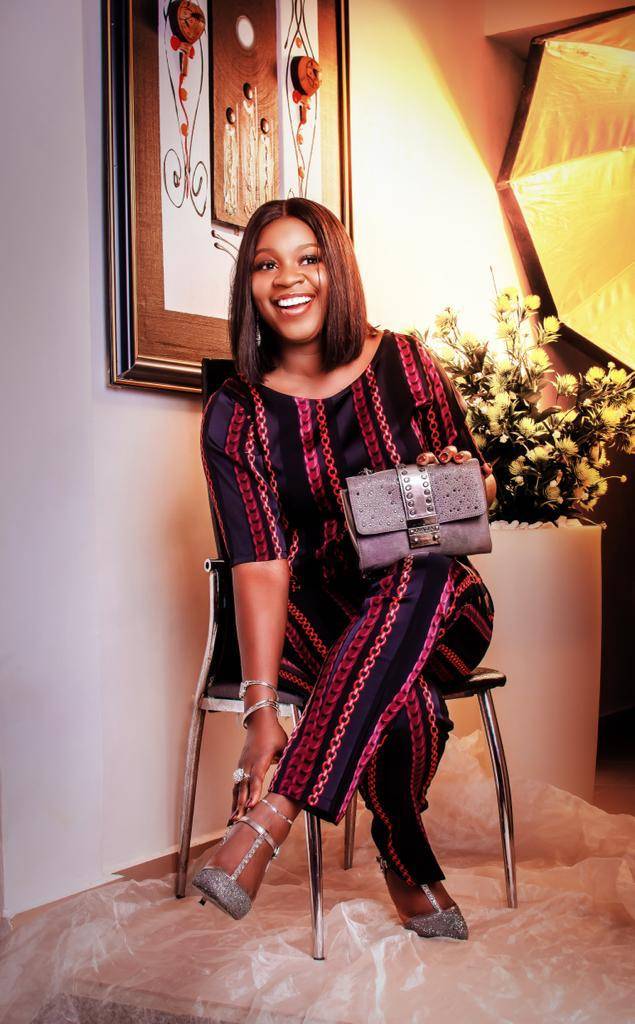
Question 10: As a visionary leader, what legacy do you hope to leave behind with your work, and what are your aspirations for the next generation of African women leaders?
Legacy is such a profound word. To me, it’s about leaving the world a little better than I found it, creating a path where none existed, and empowering others to dream bigger than they ever thought possible. My legacy isn’t just about the platforms I’ve built or the titles I’ve held—it’s about the lives I’ve touched, the barriers I’ve helped dismantle, and the opportunities I’ve created for others to rise.
I want my work to be remembered as a catalyst for transformation. Whether through #DIWDC, Duchess International Magazine, or the African Community in Surrey and Sussex, my goal has always been to amplify voices that deserve to be heard and to foster spaces where women—especially African women—can thrive unapologetically.
For the next generation of African women leaders, my aspiration is simple yet profound: that they own their stories, embrace their power, and lead with courage and compassion. I want them to see leadership not as a destination but as a responsibility to uplift others. If the platforms I’ve built can inspire even one young woman to break through societal limits and achieve her dreams, then I’ve done my job.
More than anything, I want to normalize ambition for African women. I want them to know that it’s okay to take up space, to challenge the status quo, and to dream without limits. The baton is in their hands, and I believe they will run farther and faster than we ever could.
Question 11: What keeps you motivated and grounded as you balance roles as a media executive, advocate, researcher, and global convener?
Motivation comes from the stories I hear and the people I meet. Every time I see a woman rise against the odds, every time I witness the spark of hope in someone’s eyes during #DIWDC, I’m reminded why I do what I do. It’s not just work; it’s purpose. Knowing that the platforms I’ve created are making a tangible difference in people’s lives fuels me to keep going.
What keeps me grounded is my faith, my family, and my community. Faith gives me clarity and reminds me of the bigger picture. My family keeps me centered—they are my greatest cheerleaders and my reality check when I need it. And my community? They’re my compass. Their trust, their feedback, their stories—they remind me that I’m part of something much larger than myself.
I’ve also learned to embrace balance not as a perfect state but as a dynamic process. I take time to reflect, recharge, and celebrate small wins. Whether it’s a quiet moment with a book, a walk to clear my mind, or meaningful conversations with mentors, I stay intentional about keeping my cup full so I can continue to pour into others.
Ultimately, the motivation and grounding come from the same place: knowing that this work isn’t about me. It’s about the vision, the people, and the change we’re creating together. That’s what keeps me going.
Question 12: How do you find inspiration and energy to continue creating platforms for change?
Inspiration, for me, comes from people—ordinary people doing extraordinary things despite the odds. It’s the young girl in Lagos who dreams of becoming a tech innovator but faces barriers at every turn. It’s the single mother in Nairobi juggling three jobs to give her children a brighter future. It’s the African woman in the diaspora working tirelessly to build bridges between cultures while holding on to her heritage. These stories aren’t just inspirational—they’re fuel.
I also draw energy from the ripple effect of change. When someone tells me that attending #DIWDC changed their perspective, connected them to an opportunity, or gave them the confidence to start a business, that’s an energy boost like no other. It reminds me why we started and why we must keep going.
And honestly, I’ve learned to nurture myself, too. I’ve embraced the philosophy that you cannot pour from an empty cup. I find grounding in my faith, joy in my family, and renewal in quiet moments of reflection. I think about the legacy I want to leave—not for myself but for the millions of African women who deserve to know that their dreams matter. That keeps me going.
Question 13: If you could give one message to African women across the world, what would it be?
You are enough. Your voice, your story, your resilience, and your brilliance are all enough. Never let anyone tell you otherwise.
We live in a world that often tries to define us, confine us, or make us feel as though we need permission to take up space. But the truth is, African women have always been at the forefront of change. From the ancient queens who ruled with wisdom to the mothers and daughters fighting for justice today, we’ve always been trailblazers.
My message to you is this: Own your power unapologetically. Collaborate with other women because together, we are unstoppable. And most importantly, believe in your ability to rewrite narratives, not just for yourself but for the generations to come. The world is waiting for your light—so shine as brightly as you dare.
Question 14: Where do you see Duchess International Magazine and the Duchess International Women’s Day Conference in the next ten years?
In ten years, I see Duchess International Magazine standing as the global voice for African women—a publication that doesn’t just tell our stories but shapes them, inspires them, and connects them. It will be a trusted platform for thought leadership, celebrating the achievements of African women in every corner of the world while also advocating for the changes we still need to see.
As for the Duchess Internationl Women’s Day Conference, I envision it becoming the definitive summit for African women, akin to the Davos of women’s leadership and empowerment. It will be a space where policymakers, innovators, and grassroots changemakers come together to set the agenda for the continent’s future. I see it expanding into year-round initiatives—mentorship programmes, think tanks, and economic forums that provide tangible solutions to issues African women face.
More than just growth in size, I see profound impact. I see scholarships awarded to young girls and boys who might never have had the chance to pursue their dreams. One of the core aims of the conference, and indeed Duchess Africa, is to nurture and empower both the girl child and the boy child, because true transformation lies in balance. A “Duchess” represents a woman, a mother, a nurturer of greatness—one who ensures that all her children, regardless of gender, are equipped to reach their full potential. This philosophy is at the heart of everything we do, fostering a future where both boys and girls can thrive in harmony and mutual empowerment.
I also see businesses and social enterprises born out of connections made at the conference. I see policies shaped by the ideas shared on our stages.
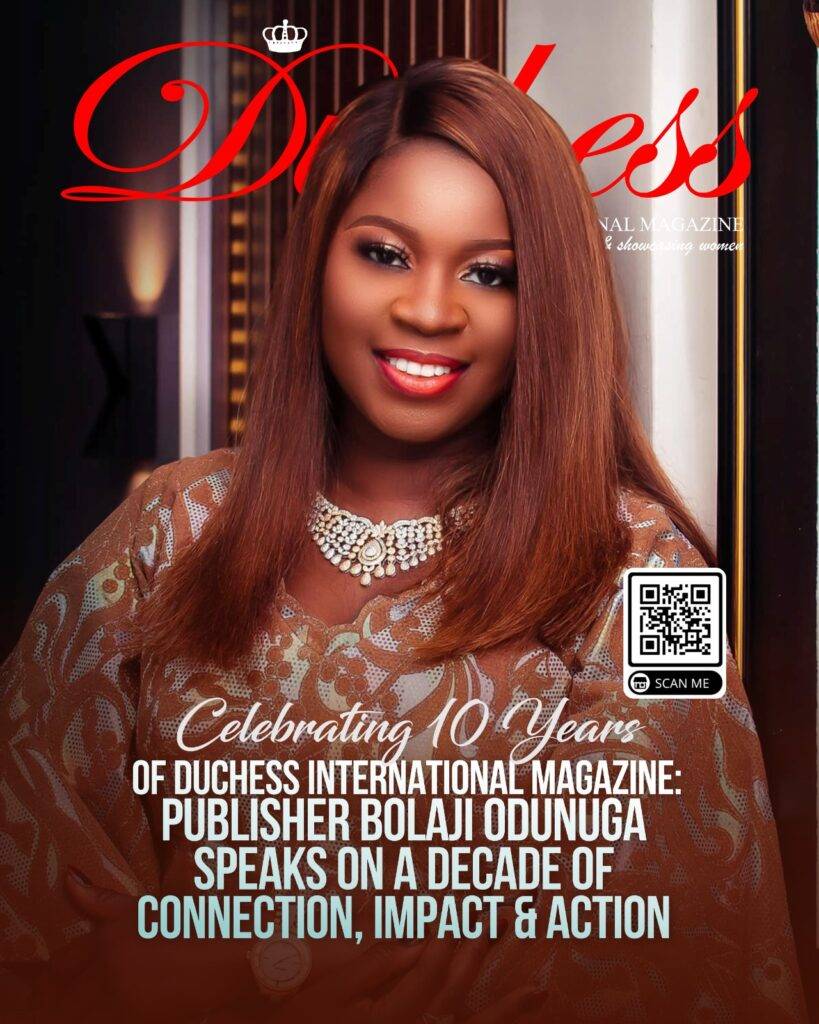
Both the magazine and the conference will be a nexus of possibilities, places where African women and their allies can dream big, act boldly, and leave lasting legacies. In ten years, we won’t just be looking back at how far we’ve come—we’ll be looking forward to how much further we can go.


